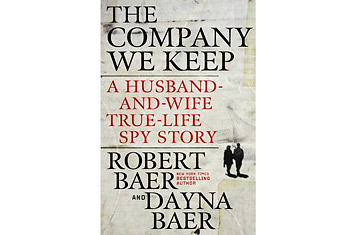
(2 of 2)
Another mile up the road we stop again, at the edge of a village. Before I can get out, an old Mercedes pulls up next to us. A man in jeans and a collared shirt gets out and introduces himself to me as Captain Walid. He doesn't say it, but I know he's Syrian intelligence. He opens the back door of the Mercedes, and I get in. Captain Walid gets in the front, next to the driver. The driver doesn't look at me, and we start.
The road up into the mountains is one lane, large stretches of it rough. It's too dark to see if the villages are inhabited or even where we are, but the shelled-out buildings say we're close to the confrontation lines. After a mile the driver gets out to push a couple of boulders off the road, the only thing that separates the Syrian army from the Christian Lebanese Forces militia. There has been fighting along this front since 1975.
We stop at the far edge of an abandoned village. "Here we wait," Captain Walid says. So I doze off.
When I wake up, it's dawn. The driver is gone, and Captain Walid's staring straight ahead. I've no idea what he's looking at, and I close my eyes to see if I can get back to sleep. Maybe five minutes later, Captain Walid says it's time for me to go. He gets out and opens the door for me.
Above us on the road, about 50 yards away, is a white Isuzu, with a man behind the wheel. I walk toward him. The fresh air wakes me up. I can see down in the Biqa'. It's hard to tell, but I think we're in the mountains across from Tripoli.
I climb into the passenger side of the Isuzu. The driver asks if I'm hungry. Not waiting for an answer, he hands me a manoushe wrapped in paper — flat bread garnished with olive oil and thyme. He finds one for himself in the bag between his legs, and we eat. He starts the car and we take off.
By eight, we're climbing up through a steep pass. At the top there's a sudden expanse of water, the Mediterranean. Tiny fishing boats are coming back into port. The villages we drive down through are now awake, people talking in front of grocery stores and bakeries. Every village has a church and a small, neatly kept municipal park with swing sets.
Another hour later, we reach the coastal Tripoli-Beirut road. We're only on it ten minutes before the Isuzu turns back up into the mountains at the sign to Laqluq, a small summer resort in the mountains.
The chalets and hotels in Laqluq are closed for the season. The driver turns down a gravel road lined by pine trees, and we stop in front of an A-frame house with a Lebanese Forces radio jeep parked outside. When I get out of the Isuzu, I can hear the heavy artillery from the direction of Beirut.
The Lebanese Forces commander — hollow cheeks, bald, dressed in olive green — opens the door for me. "Thank you for coming," he says, shaking my hand. He shows me into the living room, where a beautiful woman in Spandex and a sheepskin vest waits. "My wife," he says. We shake hands too, and the three of us sit in front of the fireplace.
I start. "The United States in no way supports General Aoun. No matter what he says about secret emissaries and a back channel to Washington, there isn't one."
The militia leader's wife interrupts. "If this is to be believed, you know what it means."
"This is strictly a Lebanese affair. It's the Lebanese who must decide what to do with Aoun, follow him into a war with Syria or remove him. Either way, expect no support from the United States."
Just then, we stop to listen to a volley of artillery coming from the mountain above us. To have the range to hit Beirut from here, the guns must be 155 mm.
"Why is he saying he has American support?" the militia leader asks.
"He's a liar."
"Can we trust you?" his wife asks.
"You'll have to decide that on your own."
When we finish, the Isuzu is waiting outside. If I'm lucky, I'll make it back to Damascus by dark.
I don't know if my message had anything to do with it, but a week later a battle erupts between the Lebanese Forces and army units loyal to General Aoun. Aoun loses and takes refuge in the French embassy. The U.S. never lifts a finger to help either side.
It's odd. In this business, we lie all the time, live with false identities. We suck the lifeblood out of our sources, pillage our contacts. Every arrangement has a twist; every favor comes with an IOU. But in the end, it all comes down to what Ali was talking about in a slightly different context: relationships, loyalty, trust. You have to tend to the human element. Without that, there's nothing.
Reprinted from THE COMPANY WE KEEP: A HUSBAND-AND-WIFE TRUE-LIFE SPY STORY Copyright © 2011 by Robert B. Baer and Dayna Baer. To be published March 8 by Crown Publishers, a division of Random House, Inc.
